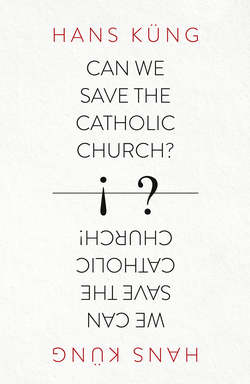Читать книгу Can We Save the Catholic Church? - Hans Kung - Страница 4
Оглавление
Hans Küng was born into a Catholic family and grew up in the small Catholic Swiss town of Sursee. He attended secondary school in the Catholic city of Lucerne.
He spent a full seven years living in Rome at the elite Collegium Germanicum et Hungaricum, where he completed his philosophical and theological studies at the Pontifical University Gregoriana. After being ordained a priest, he celebrated his first Eucharist in St Peter’s Basilica and preached his first sermon to the Swiss Papal Guard.
He completed his doctorate on the Protestant theologian Karl Barth at the Institut Catholique in Paris, where he was awarded a PhD in theology. After two years’ pastoral ministry in Lucerne, in 1960 he became professor for Catholic theology at Tübingen University at the age of 32.
He attended the Second Vatican Council from 1962 to 1965 as a theological advisor appointed by John XXIII, and taught theology for two decades at the Catholic theological faculty in Tübingen, where he also founded and headed the Institute for Ecumenical Research of the University of Tübingen.
In 1979 he gained first-hand experience of the Inquisition under the new pope, John Paul II, quite a different pope from his namesake. At the order of the Congregation for the Doctrine of the Faith, he was stripped of his ecclesiastical licence to teach as a Catholic theologian; but thanks to the fairness of German law and the good will of the federal state of Baden-Württemberg and the University of Tübingen, he retained his chair of theology and his institute, which was officially separated from the Catholic theological faculty, although friendly relations continued to prevail.
For three more decades his devotion to his Church has remained unshaken, although this loyalty has never been uncritical. The recipient of numerous awards and prizes, he has remained to this day a professor of ecumenical theology, although now officially retired, and he has remained a Catholic priest ‘in good standing’, authorized to preach and to perform all priestly offices.
He has always supported the papacy as a pastoral Petrine office within the Catholic Church, but, taking the Gospel as his yardstick, he has also assiduously called for radical reform of the papacy and especially of the Roman System which has dominated the Catholic Church for over a millennium.
Despite all his often painful and bitter experiences with this merciless Roman System, his spiritual home remains the Catholic community of faith. He has written this book to aid its recovery and to help it survive within the ecumenical Christian community.
Impressed by the decision of Pope Francis in May 2013 to appoint a committee of eight cardinals – most of them from outside the Roman Curia – to make proposals for Vatican reform, Küng resolved to send copies of this book to all of the cardinals on the committee, as the required translations become available. On 13 May 2013, Küng wrote to the pope personally, expressing his joy over the pope’s bold decision and enclosing a copy of the Spanish edition of this book. Pope Francis responded in a personal, handwritten note thanking Küng for sending him the book and indicating his interest in reading it. He closed the letter with the unpretentious friendly greeting ‘Fraternamente, Francisco’.
